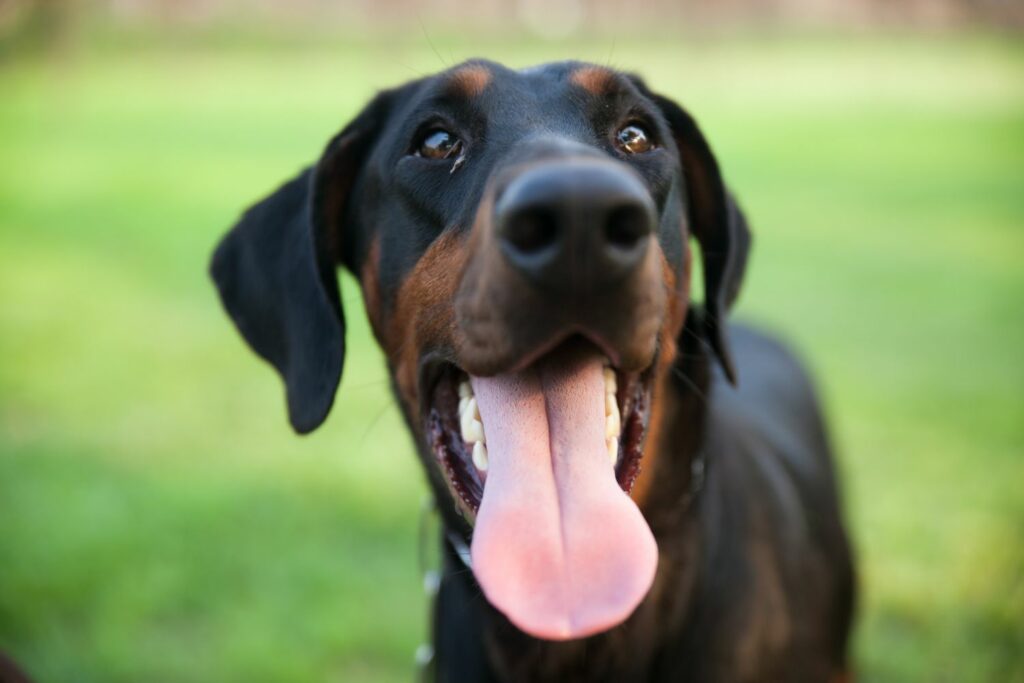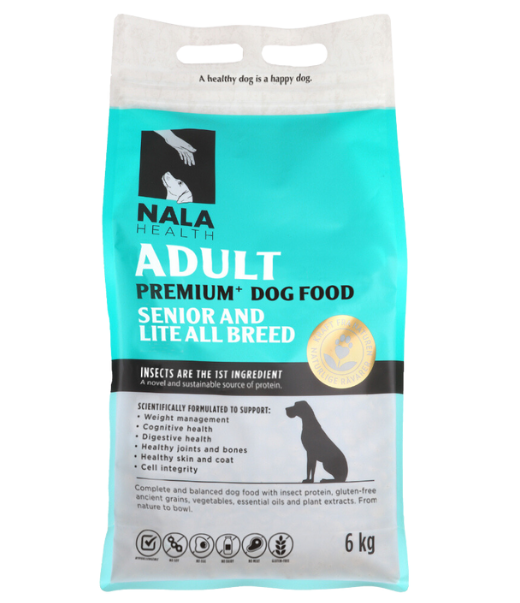Hypothyroidism in Dogs
 Cecilie Hemsen Berg
Cecilie Hemsen Berg
If your dog suddenly gains weight and seems unusually tired, it might be more than just ageing—these could be signs of hypothyroidism. This condition occurs when the thyroid gland doesn’t produce enough hormones, crucial for your dog’s metabolism and overall health. When the thyroid isn’t working properly, it can affect almost every system in your dog’s body. Hypothyroidism is especially common in medium to large breeds and rare in smaller ones.
In this blog, we’ll delve into what hypothyroidism is, its causes, and the symptoms to watch out for. We’ll also cover how it’s diagnosed, the available treatment options, and tips for living with a hypothyroid dog.

What is Hypothyroidism
To understand hypothyroidism, let’s first explore how the thyroid gland works. Think of the thyroid gland as your dog’s body’s thermostat. Just as a thermostat regulates the temperature in your home, the thyroid gland regulates your dog’s metabolism. It does this by producing thyroid hormones (T3 and T4) which control how fast or slow the body’s engines run, affecting everything from energy levels to the health of the skin and coat.
Hypothyroidism occurs when the thyroid gland, or “thermostat,” doesn’t produce enough thyroid hormones. Imagine if your home’s thermostat was set too low – the house would be cold and everything would slow down. Similarly, when a dog’s thyroid doesn’t produce enough hormones, their metabolism slows down. This can lead to a variety of symptoms like weight gain, lethargy, and skin problems because nearly every system in the body is affected by these crucial hormones.
The thyroid gland uses iodine from food to make these hormones, making proper nutrition important. Without enough iodine, the thyroid can’t produce the necessary hormones, leading to hypothyroidism. Understanding how the thyroid functions can help in recognizing and managing hypothyroidism, ensuring your dog stays healthy and active.
Causes of Hypothyroidism
Around 95% of hypothyroidism cases in dogs are genetic and due to either lymphocytic thyroiditis, where the immune system attacks the thyroid, or idiopathic atrophy, where the thyroid tissue is replaced by fat. Other risk factors include an unbalanced diet, exposure to environmental toxins like pesticides and herbicides, certain medications, and diseases like liver or kidney problems. Other causes include:
- Breeds prone to hypothyroidism: It affects all dogs, but breeds like Golden Retrievers, Doberman Pinschers, and Cocker Spaniels are more susceptible.
- Risk factors: Age (middle-aged dogs), neutering, and certain genetic predispositions can increase the risk. Spayed females tend to develop hypothyroidism more often than intact females.
Symptoms of a Slow Thyroid
The symptoms of hypothyroidism can be quite varied and often overlap with other conditions, making diagnosis challenging. Therefore, your vet may need to conduct extensive testing to confirm the condition. If your dog has hypothyroidism, you might notice one or more of the following symptoms:
- Weight Gain: Despite eating a normal amount of food, your dog may gain weight or have difficulty losing weight.
- Lethargy: Your dog may seem unusually tired, lack energy, and show less interest in play or exercise.
- Hair Loss: Thinning hair, bald spots, or a dull coat are common signs. The hair loss often occurs on the dog’s trunk, tail, and back legs.
- Dry Skin: Your dog’s skin may become dry and flaky, and they may be more prone to skin infections.
- Cold Intolerance: Dogs with hypothyroidism often seek out warm places and may shiver in cold environments.

- Behavioural Changes: Reduced activity level, depression, and increased sleep are typical behavioural changes.
- Slow Heart Rate: A slower-than-normal heart rate can be detected during a vet examination.
- Neurological Issues: In severe cases, dogs may exhibit signs like head tilting, uncoordinated movement, lameness or seizures.
- Reproductive issues: If you are trying to have a litter with your dog with no success, checking their thyroid may be beneficial.
Treatment of Hypothyroidism
Hypothyroidism is a chronic condition, meaning your dog will require lifelong treatment. Managing this condition involves a combination of hormone replacement medication and a healthy diet. Here are the key treatment options:
1. Hormone Replacement Medication:
Commonly, a vet will prescribe levothyroxine, a synthetic thyroid hormone, to replace the deficient hormones. It can take some time for your dog’s hormone levels to stabilize, so regular blood tests are necessary to monitor progress and adjust the dosage as needed. Your dog will need to stay on this medication for life to manage the condition effectively.
2. Dietary Considerations:
A balanced diet is crucial for dogs with hypothyroidism. This diet should include appropriate levels of protein, iodine, vitamins, minerals, probiotics, antioxidants, fats, and complex carbohydrates.
Iodine is particularly important because the thyroid gland uses it to produce thyroid hormones. However, too much iodine can be harmful, so supplementation should be carefully managed. Always consult with a veterinarian to ensure your dog’s diet meets all their nutritional needs and supports their thyroid health.
3. Lifestyle Changes:

Regular exercise is important to support overall health and help manage weight gain associated with hypothyroidism. Maintaining a consistent routine can help your dog adjust to their medication and dietary changes.
4. Ongoing Management:
- Regular vet check-ups and blood tests are essential to monitor hormone levels and adjust medication dosage as needed.
- Your vet will work with you to ensure your dog’s treatment plan remains effective over time.
By following these treatment guidelines and working closely with your vet, you can help your dog lead a healthy, active life despite having hypothyroidism.
Food for Hypothyroidism
When it comes to nutrition and supplements for dogs with hypothyroidism, any dietary changes or supplementation should be discussed with your veterinarian. Proper nutrition plays a vital role in managing this condition. Here are the key components of an ideal diet for a dog with hypothyroidism:
1. Essential Nutrients
- Lean, Easily Digestible Proteins: Important for maintaining muscle mass and overall health.
- Low-Fat Content: Helps in preventing weight gain, which is a common issue with hypothyroidism.
- Complex Carbohydrates: Provides a steady source of energy.
- Omega-3 Fatty Acids: Found in fish like cod or hake, these have anti-inflammatory properties and support overall health.
- Selenium and Zinc: Essential minerals for thyroid function.
- Iodine: Crucial for thyroid hormone production, but must be balanced carefully to avoid negative effects.
- Probiotics: Support digestive health and overall well-being.

2. Beneficial Foods
- Vegetables: In small amounts, steamed or cooked vegetables like green beans, carrots, celery, asparagus, mushrooms, pumpkin, and spinach can be beneficial.
- Sunflower Seeds: High in selenium, which supports the thyroid gland.
- Seaweed/Sea Lettuce: Provides a balanced amount of iodine.
3. Foods to Limit
- Goitrogenic Vegetables: Broccoli, cabbage, cauliflower, Brussels sprouts, and kale contain goitrogens, which can interfere with iodine uptake. Steaming these vegetables can reduce their goitrogen content.
- Soy Products: Contain isoflavones that can interfere with iodine absorption.
- High-Fat Foods: Can inhibit thyroid hormone production and interfere with medication absorption.
Preventive Measures
While most cases of hypothyroidism are genetic and can unfortunately not be prevented, you can take steps to reduce the risk:
- Regular Vet Check-Ups: Routine veterinary visits are essential for early detection and management of hypothyroidism. Regular blood tests, especially for high-risk breeds, can help identify thyroid issues before they become severe.
- Balanced Diet: Feed your dog a well-balanced diet rich in essential nutrients, including quality protein, vitamins, minerals, and omega-3 fatty acids. Avoid excessive iodine unless directed by your veterinarian.
- Avoid Toxins: Limit your dog’s exposure to environmental toxins, such as pesticides and herbicides, which can impact thyroid function. Choose natural cleaning and gardening products whenever possible.
- Exercise: Ensure your dog gets regular exercise to maintain a healthy weight and overall well-being. Obesity can exacerbate thyroid problems.
- Monitor for Symptoms: Keep an eye out for early signs of hypothyroidism, such as weight gain, lethargy, and skin issues. Early intervention can significantly improve your dog’s quality of life.
FAQs about Hypothyroidism
- Q: Can hypothyroidism in dogs be cured? Hypothyroidism is typically managed with lifelong medication rather than cured.
- Q: Is hypothyroidism in dogs painful? The condition itself is not painful, but untreated symptoms can cause discomfort.
- Q: How soon will I see improvement after starting treatment? Most dogs show improvement within a few weeks of starting medication.
Nala Health
While Nala Health Senior and LITE food is not specifically formulated for thyroid health, it offers a balanced, nutritious diet that can support dogs with hypothyroidism in addition to medication. Here is a closer look at the senior formula:
- High-Quality Protein: Contains 20% protein from black soldier fly larvae, which is a complete, clean, and easily digestible source of protein.
- Balanced Fat Content: Features 10% fat from black soldier fly larvae, cold-pressed canola oil, and coconut oil, providing essential fatty acids without excess fat.
- Gluten-Free Carbohydrates: Uses sorghum, millet, and oats, which are gluten-free and rich in fibre, minerals, and energy.
- Free from Common Allergens: Our food does not contain soy, wheat, maize, or barley, making it suitable for dogs with sensitivities.

Nutrient-Rich Profile:
- Essential Minerals: Includes iodine, zinc, and selenium, which are crucial for maintaining healthy thyroid function.
- Omega-3 Fatty Acids: Marine algae/sea lettuce provides a source of DHA omega-3 and iodine, supporting overall health.
- Antioxidants and Fibre: Peas, carrots, sweet potatoes, baobab fruit, rooibos, and alfalfa offer antioxidants and fibre to support the immune system and digestive health.
- Gut Health Support: Chicory root, butyrate, and probiotics help maintain a healthy gut microbiome, vital for overall well-being.
Hypothyroidism in dogs is a manageable condition with the right care, attention, and veterinary guidance. By understanding the causes, recognizing the symptoms, and adhering to a tailored treatment plan, you can help your dog live a full and active life. Regular vet check-ups, a balanced diet, and appropriate lifestyle changes are crucial in managing this condition effectively.
Remember, early detection and consistent management can make a significant difference in your dog’s quality of life. Always consult with your veterinarian for the best advice and treatment options tailored to your dog’s specific needs. With the right approach, your furry friend can continue to enjoy a happy, healthy life despite having hypothyroidism.

